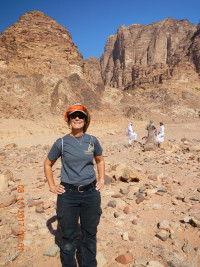 MCC Geography Professor Niccole Cerveny, Ph.D. at Wadi Rum Protected Area in Jordan.
MESA, Arizona – October 12, 2017 — Mesa Community College geography professor Niccole Cerveny, an expert on rock decay and rock art stability, participated in a U.S. Agency for International Development (USAID) Project in the Wadi Rum Protected Area, one of the major tourist attractions in Jordan. The site contains a combination of 25,000 rock carvings with 20,000 inscriptions that traces the evolution of human thought and the early development of the alphabet. The rock art illustrates the evolution of pastoral, agricultural and urban activity in the region.
MCC Geography Professor Niccole Cerveny, Ph.D. at Wadi Rum Protected Area in Jordan.
MESA, Arizona – October 12, 2017 — Mesa Community College geography professor Niccole Cerveny, an expert on rock decay and rock art stability, participated in a U.S. Agency for International Development (USAID) Project in the Wadi Rum Protected Area, one of the major tourist attractions in Jordan. The site contains a combination of 25,000 rock carvings with 20,000 inscriptions that traces the evolution of human thought and the early development of the alphabet. The rock art illustrates the evolution of pastoral, agricultural and urban activity in the region.
Researchers working on the project used the Rock Art Stability Index (RASI), which was created by Cerveny for her doctoral thesis. Cerveny assisted in the collection of data in Jordan and the training aspect of the project.
“RASI was originally designed for the desert Southwest and is an easy-to-train, low-cost analysis of rock art degradation,” Cerveny said. “Rock art is a cultural resource that receives relatively little funding in conservation. The data helps to inform site managers on how to spend their limited resources by identifying the cultural resources most in danger of decay or loss.”
Cerveny was invited to be part of the project by Kaelin Groom, Ph.D., who worked with Cerveny on an undergraduate research project funded by the National Science Foundation in 2009.
Groom’s grant is an American Center for Oriental Research (ACOR) USAID sub-grant titled Sustainable Cultural Heritage through Engagement of Local Communities Project (SCHEP). Groom, a Fulbright scholar, teaches at Arizona State University and is partnered with Dr. George Bevan from Queen’s University in Canada.
The grant has three purposes: To engage the local community, to collect data and train site stewards, and to empower site interpreters with scientific data about the Wadi Run Protected Area, a UNESCO World Heritage Site.
“Dr. Groom has translated the RASI index into Arabic, which strengthens the index,” Cerveny said. “It really made us rethink our geomorphological definitions for a novice audience through transliteration.”
The Wadi Rum Protected area is where they filmed the movie “The Martian,” with Matt Damon. It is also where Lawrence of Arabia conducted his campaign, close to the Saudi Arabia border.
Cerveny and Groom worked with an assortment of people at the site, including tour guides, site stewards and epigraphers from the Al-Hussein Bin Talal University in Jordan and a Talmudic expert.
“This was a once-in-a-lifetime experience,” Cerveny said. “The rock art, inscriptions and archaeological evidence is an exceptional testimony of the cultural traditions of the area’s early inhabitants.”
The community is invited to learn more about Cerveny's research and this expedition during an Oct. 24 presentation at MCC's Red Mountain Campus (7110 E. McKellips Rd., Mesa). The event, which is free and open to the public, will start at 6 p.m. in the Mesquite Building, Community Room.
# # #
Contact Dawn Zimmer, (480) 461-7892, Dawn.Zimmer@mesacc.edu
Mesa Community College is nationally recognized for service-learning, career and technical programs, civic engagement and innovative approaches to education. The college serves as a resource for career readiness, transfer education, workforce development and lifelong learning. Host to 30,000 students annually, MCC offers more than 195 degree and certificate programs at its two campuses and additional locations. MCC is an emerging Hispanic Serving Institution with a diverse student body that enriches the learning experience. Award-winning faculty are dedicated to student success, providing the education and training that empowers MCC students to compete locally and globally. MCC, located in the East Valley of Phoenix, Arizona, is one of the 10 colleges that comprise the Maricopa County Community College District. For additional information, visit mesacc.edu.
Mesa Community College is accredited by the Higher Learning Commission (HLC) of the North Central Association (NCA) http://www.ncahlc.org
The Maricopa County Community College District (MCCCD) is an EEO/AA institution and an equal opportunity employer of protected veterans, and individuals with disabilities.

